|
|
|
Sort Order |
|
|
|
Items / Page
|
|
|
|
|
|
|
| Srl | Item |
| 1 |
ID:
152003
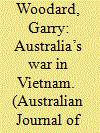

|
|
|
|
|
| Summary/Abstract |
Australia’s commitment in Vietnam can be interpreted as a small ally drawing its superpower partner into war for its own ends. Two studies by eminent Australian authors throw light on the role of human agency, and in so doing bring Australian historiography of the war closer to the trend in the United States. Peter Edwards’s history just about describes Vietnam as ‘Menzies War’. However, he finds no new sources on Menzies’s mindset, and diminishes the roles of his foreign ministers, Garfield Barwick and Paul Hasluck. The late Geoffrey Bolton’s intimate biography of Hasluck shows him as an active minister and also that his private papers are thin on Vietnam, the part of his distinguished career on which he never wrote. The Cabinet meeting of 17 December 1964 reveals much more about Australian decision-making on going to war than can be gleaned from Edwards’s cursory treatment and Bolton’s second-hand account. Barwick’s different approach, and even Hasluck’s last-minute caution, show Australia had a choice. Barwick, if he had remained Foreign Minister, might have kept Australia out of the Vietnam war, so freeing it to continue to play a leading regional political role.
|
|
|
|
|
|
|
|
|
|
|
|
|
|
|
|
| 2 |
ID:
151999
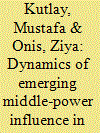

|
|
|
|
|
| Summary/Abstract |
This article attempts to understand the properties, potentials and limits of middle-power activism in a changing global order. Extensive debate on the rise of emerging powers notwithstanding, the potential contributions of emerging middle powers in regional and global governance, and the imminent challenges they face in their struggle for an upgraded status in the hierarchy of world politics, is an understudied issue. This study aims to fill this gap by offering a broad conceptual framework for middle-power activism and testing it with reference to the Turkish case. In this context, the authors aim to address the following questions: What kind of roles can emerging middle powers play in a post-hegemonic international system? What are the dynamics, properties and limitations of emerging middle-power activism in regional and global governance? Based on an extensive study of the Turkish case, the authors’ central thesis is that emerging middle powers can make important contributions to regional and global governance. Their ultimate impact, however, is not inevitable, but depends on a complementary set of conditions, which are outlined in this study.
|
|
|
|
|
|
|
|
|
|
|
|
|
|
|
|
| 3 |
ID:
152001
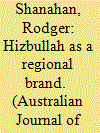

|
|
|
|
|
| Summary/Abstract |
Although the term Hizbullah (Party of God) has become synonymous with the Lebanese group that bears its name, the reality is that many more groups have, and currently do use the term. Sharing the same generic name however, is not necessarily indicative of ideological affinity let alone operational cooperation. This paper discusses the origins of the term and the groups that have adopted the name, as well as the links between them and with Iran. Besides some outlier Sunni groups who use the name, the best way to view the groups’ ideological leanings is to think of them as either intellectually supporting the Iranian concept of governance (khat al-Imam) or as more actively and practically advancing Iranian interests in the region (khat al-Hizbullah).
|
|
|
|
|
|
|
|
|
|
|
|
|
|
|
|
| 4 |
ID:
151996


|
|
|
|
|
| Summary/Abstract |
Kuwait’s support of civilians in war-torn Syria has been commended by the international community. In addition, the Gulf state has joined US-led coalitions against the ‘Islamic State’ and affirmed many international agreements designed to choke off international assistance to militias operating in Syria. In 2015, Kuwait paid a heavy price for its involvement, becoming a victim of IS-affiliated terrorism. Whilst this suggests that Kuwait’s position on radical Islamist movements involved in the Syrian conflict is clear cut, this article will argue that Kuwait’s government has had to balance this official position against domestic support for elements of the radical Islamist opposition in Syria. These cross-cutting tensions were underscored by the US designation of the state as the ‘epicentre’ of private fund raising for militias in Syria. To explore these contradictions, this article will analyse Kuwait’s engagement with the Syrian war, its new anti-terror legislation and the tensions between the official and unofficial views on support for foreign militias. This analysis will highlight the challenges the Kuwait government has faced in addressing unofficial Kuwaiti engagement with the radical Islamist opposition in Syria.
|
|
|
|
|
|
|
|
|
|
|
|
|
|
|
|
| 5 |
ID:
151997
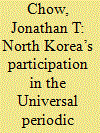

|
|
|
|
|
| Summary/Abstract |
North Korea’s participation in the UNHRC’s Universal Periodic Review (UPR)—a peer review in which states make recommendations to one another for improving human rights implementation—is a notable exception to its rejection of other human rights mechanisms. What explains North Korea’s willing participation in the UPR? This essay analyses North Korea’s participation in the first (2008–11) and second (2012–15) UPR cycles through its written submissions, responses to recommendations, and recommendations to other states. It finds that North Korea has consistently accepted weak recommendations, rejected more specific policy changes, and implemented accepted recommendations on a limited basis, allowing it to claim compliance with human rights at minimal cost. The UPR’s reliance on states’ self-reports and its inability to adjudicate competing factual claims allow North Korea to reject claims of egregious abuses, openly advocate for a radically state-centric vision of human rights, and challenge the legitimacy of human rights mechanisms like the Commission of Inquiry and Special Rapporteur while building support from other states with similar views. Notably, the Commission of Inquiry appears to have motivated North Korea to increase its cooperation with the UPR, demonstrating that the UPR complements but cannot replace other UN human rights mechanisms.
|
|
|
|
|
|
|
|
|
|
|
|
|
|
|
|
| 6 |
ID:
152000
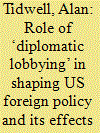

|
|
|
|
|
| Summary/Abstract |
Lobbying as a form of engagement with the US Congress has long been studied from a domestic perspective. Lobbying, however, is not a practice confined to actors with domestic interests—it is also used as a form of diplomacy by many foreign governments, including Australia. Diplomatic lobbying is a vastly understudied phenomenon and its impact on US foreign relations is rarely examined. Unlike most Westminster-based democracies, the USA has two branches directly involved with foreign affairs—the Executive and Congress—each of which is important for different aspects of foreign policy development. Australia has found lobbying the US Congress to be a powerful tool for diplomatic engagement. This article looks at the role of the US Congress in foreign affairs, the effects of lobbying, and the ways in which diplomats engage with and lobby Congress. Australia’s specific lobbying efforts and their effects on the US–Australia relationship are then examined.
|
|
|
|
|
|
|
|
|
|
|
|
|
|
|
|
| 7 |
ID:
151994
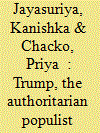

|
|
|
|
|
| Summary/Abstract |
In this short article, the authors analyse the implications of the election of Donald Trump for the future of the liberal rules-based order, with specific emphasis on its implications for the Asian region. Departing from the institutional fetishism that figures prominently in the literature, the authors argue that this liberal order needs to be conceptualised in terms of its social foundations. Particularly important to consider, in terms of understanding these social foundations, is the nature of social relations in the USA. The election of Trump reflects the deep crisis of the US state and the rise of a new ‘authoritarian populism’. The authors trace the roots of this authoritarian populism to patterns of global capitalist transformation, the crisis of the US state and the modes of crisis management that this has generated. They then explore the implications of Trump’s authoritarian populism for the region.
|
|
|
|
|
|
|
|
|
|
|
|
|
|
|
|
|
|
|
|
|